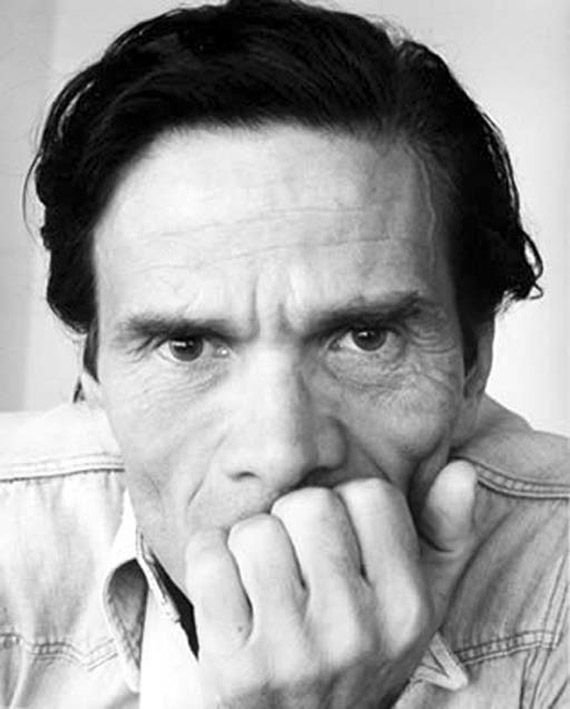
[Pier Paolo Pasolini (1922-1975)]
Today marks the date (the 38th year anniversary) of the assassination of Pier Paolo Pasolini. Following the recantation of his confession in 2005 by Pino Pelosi ("Pino the Frog"), the precise details of his homophobic and racist murder remain unclear. Andreas Pichler's recent documentary (made for the French tv channel, Arte), en francais - "L'Affaire Pasolini", gives us an eloquent and pretty up-to-date survey and account, and we present it here.
Pino Pelosi's "nuove rivelazioni" (new revelations) may be viewed here (in italiano), including a passionate Pelosi vehemently protesting
For more footage of Pelosi (who served seven of a nine-year jail term as the alleged sole perpetrator of the murder) see here and here.
Pasolini un delitto italiano(Pasolini An Italian Crime), Marco Tullio Gioradana's 1995 docu-drama was made prior to these revelations and is available here.
For comprehensive coverage of Pasolini - in italiano - see here (with its current updated site here)
Mario Sesti and Matteo Cerami's 2005 La voce di Pasolini (The Voice of Pasolini) is available in six parts here, here, here, here, here& here.

[Pasolini on the set of Salo a le 120 Giornate di Sodome (Salo, or the 120 Days of Sodom)]
Ginsberg and Pasolini - Fernando Pivano remembers - "Ginsberg spent a few months in Italy and we were very happy to host him..In order to introduce him to some Italian intellectuals, I took him to meet (Eugeno) Montale and (Salvatore) Quasimodo; at my house, I introduced him to Umberto Eco and Enrico Filippini. One day Pasolini happened to be in Milan and the two poets met, on October 17 [1967], in the sumptuous house that the architect Nanda Vigo had decorated for the businessman Spaggiari. The two writers needed an interpreter, we sat on a stone bench and for a couple of hours I felt like some kind of simultaneous translator, without the skills that these professionals have. From that meeting a beautiful friendship was born."

The next day, Pasolini wrote Allen a note - “Caro, angelico Ginsberg, ieri sera ti ho sentito dire tutto quello che ti veniva in mente su New York e San Francisco, coi loro fiori. Io ti ho detto qualcosa dell’Italia (fiori solo dai fiorai) [Dear angelic Ginsberg. Last night I heard you say everything that came into your mind about New York and San Francisco, with their flowers. I have told you something about Italy (flowers only to be found in flower shops)...sei costretto a inventare di nuovo e completamente - giorno per giorno, parola per parola - il tuo linguaggio rivoluzionario. Tutti gli uomini della tua America sono costretti, per esprimersi, ad essere inventori di parole! - "Your bourgeoisie is a bourgeoise of insane people, mine of idiots", Pasolini points out. "You rebel against insanity with insanity (giving flowers even to policemen), but how can one revolt against idiocy?.." - How, indeed!
The full text of this letter, in a (it has to be said, less-than-perfect) English translation by Allen, (in collaboration with Annette Galvano), was published, posthumously, in the late 'Seventies, (1979), in Jim Graham's Lumen/Avenue Areview.
As Simona Bondavalli in her cogent essay, "Giving Flowers to the Policeman", has pointed out, "Pasolini mentions the poetry of Allen Ginsberg as the only possible example to renew the social mandate of the poet at a time of poetic and ideological crisis. In (an)..interview with Oriana Fallaci, he includes Ginsberg in the extremely brief list of American authors that he appreciates - "I don't like (Ernest) Hemingway, nor(John) Steinbeck, very little (William) Faulkner - from (Herman) Melville I go straight to Allen Ginsberg".
In a short paragraph entitled "The Great Poets" included in what would become "almost a testament", the result of various encounters and interviews with the English journalist, Peter Dragadze, Pasolini lists Ginsberg next to Sandro Penna, Dylan Thomas, (Antonio) Machado and (Constantine) Cavafy. It is particularly the early Ginsberg he likes",Bondavalli writes, "his poetry of the 'Fifties", "a poetry that exalts despair" [in Pasolini's phrase], and where he sees "the rebellion against the domination of the society of prosperity".."This admiration for the American poet even induces Pasolini to think of him as the possible actor for the part of Jesus in "The Gospel According to Matthew"[Pasolini considered even more seriously for this role, Jack Kerouac]. Ginsberg's poetry is also the only poetry that has been able to truly represent New York".
"Like Allen Ginsberg, whose literary impact he in many ways paralleled, Pasolini brought writing out of its hermetic, academic closets and into the street.... Pasolini lived a life of such great honesty, passion, intelligence, insight and richness, that even despite--perhaps because of--its contradictions, I know of no life from which we could learn more today." (Steve Abbott)
Pasolini from "The Lost Interview", his penultimate interview -
Interviewer: You are a poet and a filmmaker. Is there a relation between these two roles?
Pasolini: As far as I'm concerned, there is a profound unity between the two of them. It's as if I were a bilingual writer.
Pasolini: As far as I'm concerned, there is a profound unity between the two of them. It's as if I were a bilingual writer.
Jack Hirschman's anthology - In Danger[sic] (from City Lights) is a pretty good entry-point for the English reader. Hirschman, in his introduction, gives credit where credit is due - to "the wonderful translations of Pasolini's Roman Poems by Lawrence Ferlinghetti and Francesca Valente, published by City Lights in 1986 (and again in 2006)", "one of the very best books that the press has ever published".
Our posting on the extraordinary event at Castelporziano in 1979 (a festival in hommage to Pasolini) is available here.
